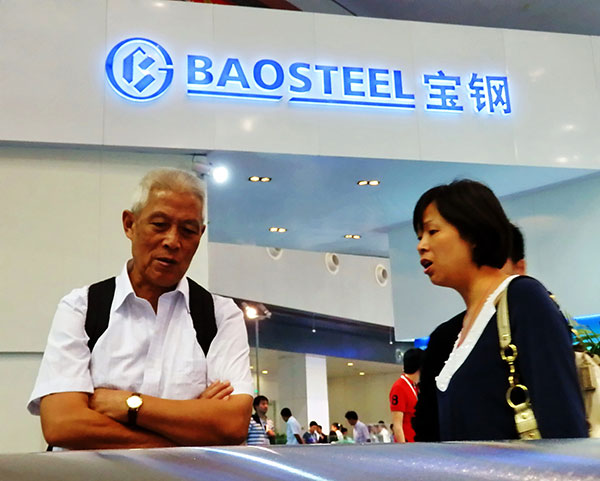Baosteel braces for shocks
By Du Juan in Xi'an (China Daily) Updated: 2015-08-26 07:24
 |
|
The stand of Baoshan Iron and Steel Co at a metallurgical industry expo in Shanghai. [Photo provided to China Daily] |
Shanghai-based Baoshan Iron and Steel Co, China's largest listed steelmaker, said on Tuesday that it has taken enough measures to guard against further losses from currency swings.
Dai Zhihao, general manager of the Shanghai-based company, said that the company's profits fell by about 18 percent in the past few months due to the currency rate reform. The government changed the reference rate for the yuan against the United States dollar by 1.9 percent on Aug 11.
"Baosteel has taken actions to cope with the resultant changes," Dai said. "We have also accepted the results from the two-day yuan depreciation."
According to Dai, the company had gained 10.5 billion yuan ($1.64 billion) profit from the appreciation of the yuan and low financing costs with foreign currencies between 2005 and 2014. Consequent to the currency depreciation, Baosteel's outstanding foreign debt has become more expensive, he said.
The company expects its net profit for the first nine months to drop by 50 percent to 60 percent year-on-year, mainly due to the currency depreciation and weak demand for steel products in the domestic market, especially from the automobile sector.
"The flagging growth in China's automobile industry was beyond our expectations. However, Baosteel will try its best to maintain a stable market share," Dai said. "Compared with other manufacturers, we have a complete production chain and various high-end products to cater to the diverse needs of clients."
Wei Zengmin, a senior analyst with industrial information provider Mysteel.com, said the domestic steel production capacity for automobiles is growing steadily as several new projects are gradually put into operation.
"Rising supplies and weakening demand for automobile steel will trigger even more fierce competition in the future," he said.
During the first six months, Baosteel's net income was 3.17 billion yuan, up 0.65 percent year-on-year from 3.15 billion yuan a year earlier. Revenue fell 17.24 percent year-on-year to 80.8 billion yuan during the period.
Baosteel's half-year performance is still better than most of its industry peers, in a sector riddled with shrinking demand and low prices.
According to the China Iron and Steel Association, the overall net profit of medium-sized and large mills fell 3.3 percent from a year earlier to 1.64 billion yuan.
Chen Kexin, a senior analyst with Lange Steel Information Research Center, said China will continue to face an economic slowdown and low growth in the second half of the year. However, the yuan depreciation may boost China's steel exports.
"The global economic recovery will trigger demand for Chinese steel products," he said. "China's direct and indirect steel exports will reach 200 million metric tons this year."
Nevertheless, he said, the yuan depreciation will also hit Chinese steel companies as cost of key raw materials like iron ore and coking coal will rise sharply.
- 2015 China International Fair for Investment and Trade kicks off in Xiamen
- China's commodity imports robust in Jan-Aug period
- China stocks rebound 2.92%
- 2015 China box office already past 2014 total
- China foreign trade decline widens in August
- Interview: JP Morgan's senior executive bullish on China
- Innovation, development the focus for NZ mayors
- Lives of freelancers

















